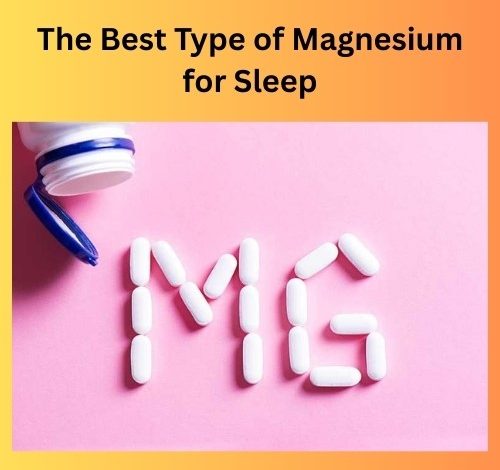The Best Type of Magnesium for Sleep—Backed by Science and Sleep Specialists

Sleep is the cornerstone of physical recovery, mental clarity, and emotional balance. If you’ve tried calming teas, blackout curtains, and strict bedtimes but still toss and turn, magnesium may be a missing piece. But not all magnesium supplements are the same. Some forms are better absorbed, some are gentler on the stomach, and some may work directly in the brain. Clearly and with sources—which type of magnesium specialists most often recommend for sleep, why it might help, what the evidence actually shows, and how to choose a safe, practical supplement routine.
Quick answer (if you’re in a hurry)
Magnesium glycinate is the most commonly recommended form for sleep problems because it pairs magnesium with glycine (a calming amino acid), is well absorbed, and is gentle on the digestive system. Magnesium L-threonate shows promise for improving sleep quality and cognitive benefits because it more readily enters the brain, but it tends to be more expensive. Other forms (citrate, oxide, sulfate) have different uses (e.g., constipation, topical baths) and are less ideal if your main goal is sleep. These conclusions reflect sleep-specialist guidance and recent clinical studies and reviews.
How magnesium affects sleep — the biology in plain English
Magnesium is an essential mineral involved in hundreds of processes in the body. For sleep specifically, magnesium helps in a few key ways:
- Supports GABA activity. GABA (gamma-aminobutyric acid) is the brain’s primary inhibitory neurotransmitter—basically the “brake” that quiets neural activity so you can relax and fall asleep. Magnesium acts as a cofactor at GABA receptors and helps GABA bind and function more effectively, promoting calm.
- Regulates melatonin and circadian rhythms. Magnesium helps enzymes involved in melatonin synthesis and may support the natural night-time hormonal signals that tell your body to sleep.
- Relaxes muscles and reduces cramps. By influencing calcium and potassium channels, magnesium helps muscle cells relax—useful if nighttime leg cramps or muscle tension disrupt sleep.
These mechanisms explain why magnesium is often proposed as a natural sleep aid. However, mechanisms alone don’t prove clinically meaningful effects—so let’s look at the evidence.
What the science says: studies and reviews
The research on magnesium and sleep is mixed but leaning toward modest benefit in certain groups.
- A systematic review of observational studies found an association between magnesium status and several sleep measures (time to fall asleep, daytime sleepiness, snoring, sleep duration), but randomized trials were inconclusive and varied in quality. This means low magnesium status correlates with worse sleep, but supplement trials haven’t consistently produced large, reliable effects.
- Several randomized controlled trials (including an older double-blind trial in older adults) found improvements in sleep indices—shorter sleep onset latency and modest increases in total sleep time—when magnesium supplementation (typically 250–500 mg elemental magnesium) was used, though sample sizes were often small and trials varied.
- More recently, studies specifically examining magnesium L-threonate (MgT) report improvements in objective and subjective sleep measures, especially in deep/REM sleep and daytime functioning, suggesting this form may help through central (brain) effects. Several 2023–2024/2025 publications showed promising signals, though larger confirmatory trials are still needed.
- Meta-analyses and evidence syntheses up to 2024–2025 indicate magnesium supplementation likely reduces sleep onset latency (time to fall asleep) modestly in adults, but the quality and heterogeneity of studies temper confidence; effects are probably most noticeable in people with low magnesium status or older adults with insomnia symptoms.
Bottom line: The evidence supports that magnesium can help some people fall asleep faster and modestly improve sleep quality—especially when deficiency or low dietary intake is present—but it’s not a universal cure. The form you choose matters for absorption, side effects, and brain-specific benefits.
Which magnesium forms matter for sleep? Clear comparisons
Here’s a practical breakdown of common forms you’ll see on supplement labels and what they mean for sleep:
1. Magnesium glycinate (bisglycinate)
Why specialists favor it for sleep: Magnesium bound to glycine. Glycine is a calming amino acid that may help sleep, and the complex is highly bioavailable and gentle on the gut. Many sleep guides and organizations list glycinate as the top choice for sleep and anxiety-related sleep problems.
Best for: Sleep onset difficulties, anxiety-driven insomnia, those with sensitive stomachs.
Downsides: Generally few; more costly than oxide but widely available.
2. Magnesium L-threonate (MgT)
Why it’s special: Threonate crosses the blood–brain barrier more effectively and appears to increase brain magnesium levels. Recent trials found improvements in objective and subjective sleep measures and cognitive outcomes, suggesting it may uniquely support sleep architecture and daytime function.
Best for: People who want cognitive benefits alongside better sleep or those with brain-fog/age-related cognitive concerns.
Downsides: More expensive; clinical evidence is promising but still newer and less extensive than glycinate.
3. Magnesium citrate
Why people buy it: Highly bioavailable and commonly used to address constipation. It’s absorbed well but can have a laxative effect at higher doses.
Best for: Occasional constipation + magnesium boost.
Downsides: Laxative effects can disturb sleep if taken at the wrong time or at higher doses. Not the first-line for sleep alone.
4. Magnesium oxide
Why it’s less desirable for sleep: Cheap and contains a lot of elemental magnesium by weight, but it is poorly absorbed and more likely to cause digestive upset. It’s not the top choice for raising usable magnesium for neurologic or sleep benefits.
5. Magnesium sulfate (Epsom salt) — topical/bath
Why people use it: Taken as an Epsom salt bath for muscle relaxation. Evidence for significant transdermal absorption is limited, but warm baths themselves promote relaxation and may indirectly improve sleep. Useful for muscle soreness and pre-sleep ritual, but oral forms are better for systemic sleep effects.
6. Magnesium malate, taurate, or others
Notes: Malate is often suggested for energy and muscle performance; taurate is sometimes promoted for cardiovascular support. These can be useful depending on the targeted issue but are not the leading picks for sleep specifically.
Specialist guidance on dose and timing
Sleep specialists and major clinics generally suggest:
- Dose: 200–500 mg of elemental magnesium per day is commonly recommended in studies and expert guidance for sleep support. Many sleep clinicians suggest starting around 250–300 mg at bedtime and adjusting as needed. (Elemental magnesium is the magnesium content, not the total supplement weight—read labels.)
- Timing: Taken 30–60 minutes before bed is a reasonable routine. Some people split doses or take with dinner to reduce any mild stomach upset.
- Duration: Benefits may appear in days to weeks. Some trials used 4–8 week interventions to measure effects. If you don’t notice benefit after a month or two, re-evaluate with a clinician.
Important safety notes: Avoid taking very high doses (typically > 350–400 mg/day of supplemental magnesium beyond dietary intake without medical supervision) because excess magnesium can cause diarrhea, abdominal cramping, and in extreme cases irregular heartbeat or low blood pressure—especially in people with kidney disease. If you have kidney problems or take medications (like certain diuretics, heart meds, or antibiotics), talk to your provider before starting supplements.
How to pick the best magnesium for your specific sleep problem
- If your main issue is difficulty falling asleep because of tension/anxiety: Start with magnesium glycinate. Glycine’s calming properties plus good absorption make glycinate the sleep-specialist favorite.
- If you have cognitive complaints, wake up unrefreshed, or want brain benefits too: Consider magnesium L-threonate—studies suggest it improves sleep architecture and daytime cognition. Expect a higher price tag.
- If constipation is also a problem: Magnesium citrate can help, but beware of laxative effects that may disturb sleep if taken late at night. Consider taking it earlier in the evening or during the day.
- If you’re just looking for muscle relaxation or a pre-bed ritual: Epsom salt baths (magnesium sulfate) can be relaxing—even if transdermal uptake is limited, the warm bath and relaxation may help sleep onset.
- If you have digestive sensitivity or want the most tolerated option: Magnesium glycinate is gentle; avoid oxide unless directed for a specific reason.
Realistic expectations — what magnesium will (and won’t) do
- Will likely help: People with low dietary intake, older adults with insomnia, or those whose sleep problems are linked to anxiety/muscle tension may see modest improvements—shorter time to fall asleep and slightly better sleep quality.
- Won’t necessarily fix: Severe insomnia rooted in sleep apnea, circadian rhythm disorders, psychiatric conditions, or chronic medical illness. Magnesium is an adjunct, not a replacement for behavioral therapy (CBT-I), CPAP for apnea, or prescription sleep meds when indicated.
Practical tips for taking magnesium for sleep
- Check the label for elemental magnesium. A capsule may list the compound (e.g., magnesium glycinate 450 mg) but provide less elemental magnesium—learn to read labels or use manufacturer info.
- Start low and build up. Begin with ~200–300 mg at night to assess effects and tolerance; increase only if needed and safe.
- Take with food if you’re sensitive. Food can reduce stomach upset.
- Avoid big doses that produce diarrhea. Loose stools are a sign you’ve overshot your absorption threshold. If that happens, lower the dose or change forms.
- Combine with sleep hygiene. Magnesium works best alongside consistent sleep schedules, reduced evening blue light, and a calm pre-bed routine.
Who should be cautious or avoid magnesium supplements?
- People with kidney disease should not take magnesium supplements without medical approval—kidneys clear magnesium, and impaired function can cause dangerous accumulation.
- Those on interacting medications (certain diuretics, heart rhythm medications, some antibiotics) should check with their clinician.
- Pregnant or breastfeeding people should consult a healthcare provider before starting daily supplementation—dietary magnesium from food is usually preferred unless deficiency is documented.
Sample nightly regimen (example, not medical advice)
- Evening (with light snack): 200–300 mg elemental magnesium glycinate taken 30–60 minutes before bed.
- Follow with a calming, screen-free bedtime routine (reading, warm shower or bath, dim lights).
- Reassess sleep after 2–4 weeks—note time to fall asleep, number of awakenings, and how refreshed you feel in the morning. Adjust with clinician input if needed.
Summary and final recommendations
- Best general option for sleep: Magnesium glycinate—highly bioavailable, gentle, and supportive of relaxation through its glycine component. Recommended by sleep resources and clinicians.
- Best if cognitive/brain effects are a priority: Magnesium L-threonate—promising clinical data for improving sleep architecture and daytime cognition, though costlier.
- Evidence strength: Mixed but growing. Trials and reviews indicate modest benefits—particularly for sleep onset latency and in people with low magnesium status—while newer work on Mg-threonate is encouraging.
- Always consider safety: Start with moderate doses, watch for GI side effects, and consult your healthcare provider if you have kidney disease or take interacting medications.
Quick reference sources (selected)
- Sleep Foundation — Using Magnesium for Better Sleep.
- PubMed / systematic reviews on magnesium and sleep.
- Recent trials on magnesium L-threonate and sleep.
- Mayo Clinic and related clinic guidance on magnesium dosing and safety.
Final note
If your sleep problems are chronic or severe—waking gasping, loud snoring and daytime tiredness, or long-term insomnia—see a sleep specialist. Magnesium can be a helpful, low-risk tool for many people, but it’s most effective when combined with tailored medical advice and good sleep habits.
If you’d like, I can:
- draft a one-page summary you can print and bring to your doctor, or
- make a simple 4-week magnesium + sleep-hygiene plan you can follow and track results with nightly logs.




